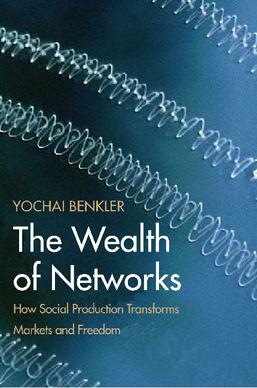Collaborative economy may refer to:
Collaborative economy may refer to:
Participatory economics, often abbreviated Parecon, is an economic system based on participatory decision making as the primary economic mechanism for allocation in society. In the system, the say in decision-making is proportional to the impact on a person or group of people. Participatory economics is a form of a socialist decentralized planned economy involving the collective ownership of the means of production. It is a proposed alternative to contemporary capitalism and centralized planning. This economic model is primarily associated with political theorist Michael Albert and economist Robin Hahnel, who describes participatory economics as an anarchist economic vision.
Internet exchange points are common grounds of IP networking, allowing participant Internet service providers (ISPs) to exchange data destined for their respective networks. IXPs are generally located at places with preexisting connections to multiple distinct networks, i.e., datacenters, and operate physical infrastructure (switches) to connect their participants. Organizationally, most IXPs are each independent not-for-profit associations of their constituent participating networks. The primary alternative to IXPs is private peering, where ISPs directly connect their networks.
Commons-based peer production (CBPP) is a term coined by Harvard Law School professor Yochai Benkler. It describes a model of socio-economic production in which large numbers of people work cooperatively; usually over the Internet. Commons-based projects generally have less rigid hierarchical structures than those under more traditional business models.

Sharing is the joint use of a resource or space. It is also the process of dividing and distributing. In its narrow sense, it refers to joint or alternating use of inherently finite goods, such as a common pasture or a shared residence. Still more loosely, "sharing" can actually mean giving something as an outright gift: for example, to "share" one's food really means to give some of it as a gift. Sharing is a basic component of human interaction, and is responsible for strengthening social ties and ensuring a person’s well-being.

Michel Bauwens is a Belgian theorist in the emerging field of peer-to-peer (P2P), a writer, and a conference speaker on the subject of technology, culture and business innovation. Bauwens founded the P2P Foundation, a global organization of researchers working in open collaboration in the exploration of peer production, governance, and property. He has authored a number of essays, including his thesis The Political Economy of Peer Production.

The United Nations Research Institute for Social Development (UNRISD) is "an autonomous research institute within the United Nations that undertakes multidisciplinary research and policy analysis on the social dimensions of contemporary development issues". UNRISD was established in 1963 with the mandate of conducting policy-relevant research on social development that is pertinent to the work of the United Nations Secretariat, regional commissions and specialized agencies, and national institutions.
Peer production is a way of producing goods and services that relies on self-organizing communities of individuals. In such communities, the labor of many people is coordinated towards a shared outcome.
Peer-to-peer computing or networking is a distributed application architecture that partitions tasks or workloads between peers.

The Wealth of Networks: How Social Production Transforms Markets and Freedom is a book by Harvard Law School professor Yochai Benkler published by Yale University Press on April 3, 2006. The book has been recognized as one of the most influential works of its time concerning the rise and impact of the Internet on the society, particularly in the sphere of economics. It also helped popularize the term Benkler coined few years earlier, the commons-based peer production (CBPP).
Collaborative consumption is the set of those resource circulation systems in which consumers both "obtain" and "provide", temporarily or permanently, valuable resources or services through direct interaction with other consumers or through a mediator. It is sometimes paired with the concept of the "sharing economy". Collaborative consumption is not new; it has always existed.
Production for use is a phrase referring to the principle of economic organization and production taken as a defining criterion for a socialist economy. It is held in contrast to production for profit. This criterion is used to distinguish communism from capitalism, and is one of the fundamental defining characteristics of communism.
Peer-to-peer carsharing is the process whereby existing car owners make their vehicles available for others to rent for short periods of time.
Collaborative finance is a category of financial transaction that occurs directly between individuals without the intermediation of a traditional financial institution. This new way to manage informal financial transactions has been enabled by advances in social media and peer-to-peer online platforms. The wide variety of collaborative finance resources may vary not only in their organizational and operational aspects but also by geographical region, share of the financial market, etc. It is precisely this heterogeneity that enables the informal savings and credit activity to profitably reach those income-groups not served by commercial banks and other financial institutions. It is their informality, adaptability and flexibility of operations – characteristics which reduce their transaction costs and confers upon them their comparative advantage and economic rationale. Collaborative Finance is characterized by highly personalized loan transactions entailing face-to-face dealings with borrowers and flexibility in respect to loan purpose, interest rates, collateral requirements, maturity periods and debt rescheduling.
In Marxist thought, a communist society or the communist system is the type of society and economic system postulated to emerge from technological advances in the productive forces, representing the ultimate goal of the political ideology of communism. A communist society is characterized by common ownership of the means of production with free access to the articles of consumption and is classless, stateless, and moneyless, implying the end of the exploitation of labour.
Distributed manufacturing also known as distributed production, cloud producing, distributed digital manufacturing, and local manufacturing is a form of decentralized manufacturing practiced by enterprises using a network of geographically dispersed manufacturing facilities that are coordinated using information technology. It can also refer to local manufacture via the historic cottage industry model, or manufacturing that takes place in the homes of consumers.
The sharing economy is a socio-economic system whereby consumers share in the creation, production, distribution, trade and consumption of goods, and services. These systems take a variety of forms, often leveraging information technology and the Internet, particularly digital platforms, to facilitate the distribution, sharing and reuse of excess capacity in goods and services.
Open collaboration refers to any "system of innovation or production that relies on goal-oriented yet loosely coordinated participants who cooperate voluntarily to create a product of economic value, which is made freely available to contributors and noncontributors alike." It is prominently observed in open source software, and has been initially described in Richard Stallman's GNU Manifesto, as well as Eric S. Raymond's 1997 essay, The Cathedral and the Bazaar. Beyond open source software, open collaboration is also applied to the development of other types of mind or creative works, such as information provision in Internet forums, or the production of encyclopedic content in Wikipedia.

Mayo Fuster Morell is a social researcher. Her research has focused on sharing economy, social movements, online communities and digital Commons, frequently using participatory action research and method triangulation. She has been part of the most important research centres studying Internet and its social effects, including the Berkman Center for Internet and Society, the MIT Center for Civic Media or the Berkeley School of Information. As an active citizen, she is the co-founder of multiple initiatives around digital Commons and Free Culture, such as the Procomuns Forum on collaborative economy.
A platform cooperative, or platform co-op, is a cooperatively owned, democratically governed business that establishes a two-sided market via a computing platform, website, mobile app or a protocol to facilitate the sale of goods and services. Platform cooperatives are an alternative to venture capital-funded platforms insofar as they are owned and governed by those who depend on them most—workers, users, and other relevant stakeholders.
Collaborative society is a view of human society defined as encompassing the emerging phenomena of citizen science, collaborative media, digital communication gift economy, peer production, remix culture, and the sharing economy. It relies on various modes of distribution of resources in the economy, and their resulting consumption, based around the basic principles of sharing and collaboration. Dariusz Jemielniak and Aleksandra Przegalińska have defined it as "a series of services... that enable peer-to-peer exchanges and interactions through technology" as well as "an increasingly recurring phenomenon of emergent and enduring cooperative groups, whose members have developed particular patterns of relationships through technology-mediated cooperation"